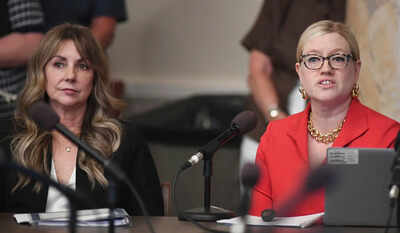ARTICLE AD BOX

In this photo provided by Mississippi Today, Laurie Todd-Smith, U.S. Department of Health and Human Services deputy assistant secretary for the Office of Early Childhood Development, left, and Lindsey Burke, deputy chief of staff for policy and programs at the U.S. Department of Education, answer questions posed by legislators during the legislative school choice subcommittee meeting at the state Capitol, Monday, Aug. 25, 2025, in Jackson, Miss. (Mississippi Today via AP)
Mississippi lawmakers are considering expanding school choice policies after federal education officials encouraged the state to adopt new programs aimed at increasing parental control over K-12 education.
At the first meeting of the "Education Freedom" select committee, supporters outlined the potential benefits of school choice, while critics warned of risks to public schools and questioned the impact on academic gains.The committee, formed by House Speaker Jason White, met amid standing room only to discuss legislation that could allow families to use state funds for private schooling or other educational expenses.
Federal officials appointed by President Trump voiced their support for such measures, urging lawmakers to consider options like universal education savings accounts (ESA) and tax credit scholarship programs.How school choice programs work in MississippiSchool choice, often termed "education freedom" by proponents, includes policies that allow parents to spend state-allocated education funds on various educational options, including private schools, tutoring, or other services.
Mississippi currently offers ESAs only to students with disabilities. A universal ESA programme would broaden eligibility to all students, permitting families to use funds more flexibly.Lindsey Burke, Deputy Chief of Staff for Policy and Programs at the US Department of Education, emphasised during the meeting that neighbouring states had adopted school choice measures and urged Mississippi to "think differently" about education delivery, as reported by the Associated Press.
Burke explained that a universal ESA programme would be particularly helpful in rural areas where private schools may not be readily accessible.In addition to ESAs, voucher programmes would provide parents with coupons to pay for private or faith-based school tuition. Burke also described a new federal tax credit programme allowing Mississippians to contribute up to $1,700 to scholarship organisations and receive equivalent tax breaks.
This programme is expected to begin in 2027 and could further support private school attendance.Concerns over public school funding and academic progressOpponents of school choice raised concerns about potential negative effects on public schools, which some say are already underfunded. Democratic lawmakers highlighted that Mississippi has fully funded its education formula only four times since 2003. Rep Jeffrey Hulum III of Gulfport cautioned that the state should wait to observe the impact of the new funding formula before reallocating public funds, as reported by the Associated Press.Republican Rep Rob Roberson, chair of the House Education Committee and the Education Freedom committee, urged attendees not to become "too emotional" and noted that the discussion was "not about politics," according to the Associated Press. Meanwhile, Rep Kevin Felsher of Biloxi pointed out that only two school districts in Mississippi are classified as failing by the state education department and questioned the need for such sweeping reforms.Burke responded to these concerns by stating that "even the best school is not the best school for everybody" and argued that "not failing" was a low standard for the state to hold itself to, as quoted by the Associated Press. She noted there is limited evidence that low-income students improve test scores by attending private schools, but emphasised choice as a key benefit.Early education and expanding options for familiesLaurie Todd-Smith, who leads the federal office overseeing Head Start and child care, focused on early education, noting Mississippi already offers choice-based pre-K programmes.
She encouraged expansion of early education infrastructure, particularly child care, to provide more options to parents, as reported by the Associated Press.Republican Rep Jansen Owen, co-chair of the committee, stated that maintaining and extending the state's education gains requires "continuous efforts and reforms," as quoted by the Associated Press. The committee plans to meet again on September 25 to continue discussions on school choice.Mississippi faces a pivotal decision on whether to adopt broader school choice policies supported by the current US administration or to maintain focus on strengthening the public school system amid concerns over funding and accountability.TOI Education is on WhatsApp now. Follow us here.



.png)
.png)
.png)
















 4 hours ago
3
4 hours ago
3








 English (US) ·
English (US) ·